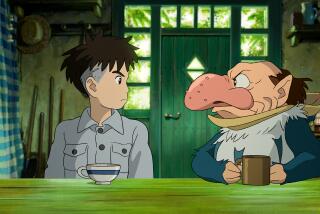Review: The updated ‘Ben-Hur’ has little to offer besides chariot thrills
- Share via
“Ben-Hur” is quite the sitting duck. What, after all, makes a more inviting target than an attempt to refurbish a film that won a then-record 11 Oscars, including best picture, and earned a ton of money to boot?
Yet, on the other hand, that 1959 “Ben-Hur” was hardly a sacred text but rather a remake of a 1925 silent version inspired in turn by an 1880 novel a former Civil War general and governor of the New Mexico territory wrote in his spare time.
And, truthfully, that William Wyler-directed, Charlton Heston-starring epic did have its longeurs, clocking in at 3 hours and 44 minutes plus intermission and making critic Dwight McDonald feel like “a motorist trapped at a railroad crossing while a long freight train slowly trundled by.”
But if taking another crack at this biblical-era tale of a rivalry between two former friends whose deadly competition intertwines with the life of Christ is no sin, what has resulted is not going to win friends or influence people.
As directed by Timur Bekmambetov, this 21st century “Ben-Hur” is more phlegmatic than awful, a by and large dull and lethargic piece of work that is not bad enough to get mad at. What it lacks most of all is a convincing reason to exist.
Words like lethargic are not usually associated with Bekmambetov, who made his reputation in Russia with the visceral “Night Watch” and went on to direct the misbegotten but energetic “Abraham Lincoln: Vampire Hunter.”

Jack Huston, Morgan Freeman and Toby Kebbell star in “Ben-Hur.”
And Bekmambetov does make the most of “Ben-Hur’s” signature sequence, the celebrated all-out chariot race between Judah Ben-Hur (Jack Huston), Jewish prince turned escaped galley slave, and the mercurial Messala (Toby Kebbell), his adopted brother turned Roman autocrat.
But as the 1959 version demonstrated, these action moments need underlying dramatic plausibility to be most effective, and neither Huston, the grandson of director John Huston who has his own line of Oliver Peoples eyewear, nor Kebbell, who was the evil Koba in “Dawn of the Planet of the Apes,” have the heft or charisma to make their roles convincing.
Bebmambetov has indicated in interviews that he views this “Ben-Hur” as providing not just chariot thrills but also a message about forgiveness for a world in desperate need of it.
The director, however, lacks the subtlety of touch necessary to realize that goal and an unconvincing script by Keith R. Clarke and John Ridley does not help matters, so much so that even as ordinarily serene an actor as Morgan Freeman has trouble finding his footing.
“Ben-Hur” begins in 33 A.D. with a hint of things to come as Judah and Messala exchange testy words before that all-important chariot competition. Then it flashes back eight years to a horse race in the desert that underlines the competitiveness between these sterling young men.
Movie Trailers
But though Judah is a wealthy aristocrat and Messala his lowly adopted brother (upgraded from close friend in the last version), the two are so close that when that horse race ends in injury, Messala schleps Judah home through miles of desert sand.
Judah not only lives a luxe life, he’s surrounded by beautiful women with posh accents, including his mother, Naomi (Ayelet Zurer), his sister, Tirzah (Sofia Black B’Elia), and Esther (Nazanin Boniadi), the woman he loves and marries.
Understandably feeling left out, Messala runs off to join the Roman army, where he becomes the protégé of Pontius Pilate (top Danish actor Pilou Asbaek, the spin doctor in “Borgen”), who brings him along when he becomes ruler of Judea.
In Messala’s absence, freedom fighters called zealots have become a force, and while status-quo loving Judah isn’t interested in rebellion, an act of misguided generosity insures that before you can say “Hail Caesar,” he’s imprisoned as galley slave No. 61 and his mother and sister flat out disappear.
“Ben-Hur” wouldn’t be much of a story if Judah ended his days reduced to slavery, so circumstances get him to dry land where he meets Sheik Ilderim (Freeman), a chariot-racing entrepreneur who notices his facility with horses and makes that big race with Messala happen.
Director Bekmambetov is much more in his element inside the Roman circus, and using visual reference points that were unavailable in 1959 (YouTube auto racing videos, GoPro cameras) he has placed viewers in the middle of things in a way that is undeniably effective.
Given that the original novel was subtitled “A Tale of the Christ” for a reason, this film also features Rodrigo Santoro as a magnetic working carpenter Jesus who insists “God is love” and tells individuals the almighty “has a path planned for you” even when they don’t want to hear it.
But though the presence of executive producers Mark Burnett and Roma Downey (the “Son of God” miniseries) indicate that “Ben-Hur” has an interest in attracting faith-based audiences, this film’s brotherhood-heavy story line ends up emphasizing faith less than its predecessor did.
While the 1959 “Ben-Hur” has its pros and cons, its deep sense of Hollywood professionalism grounded it in a way that is still impressive. The 2016 “Ben-Hur” is not convincingly anything, and no amount of chariot racing can make up for that.
====
MPAA rating: PG-13 for sequences of violence and disturbing images.
Running time: 2 hours, 5 minutes.
In general release.
“Ben-Hur.” More phlegmatic than awful, this revisiting of the twice-filmed story of rivalry between former friends in the time of Jesus is not bad enough to get mad at. What it lacks most of all is a convincing reason to exist. - Kenneth Turan
More to Read
Only good movies
Get the Indie Focus newsletter, Mark Olsen's weekly guide to the world of cinema.
You may occasionally receive promotional content from the Los Angeles Times.











